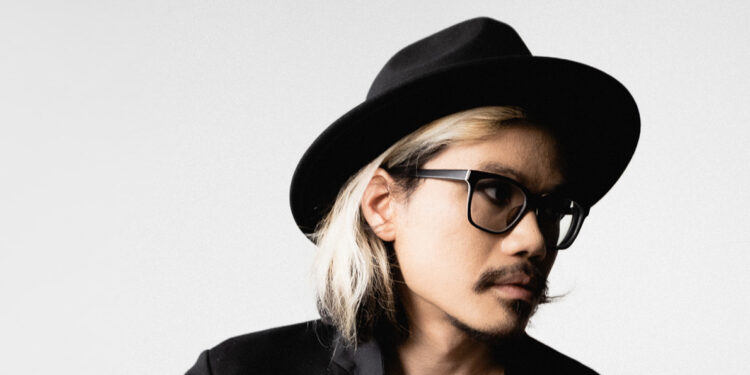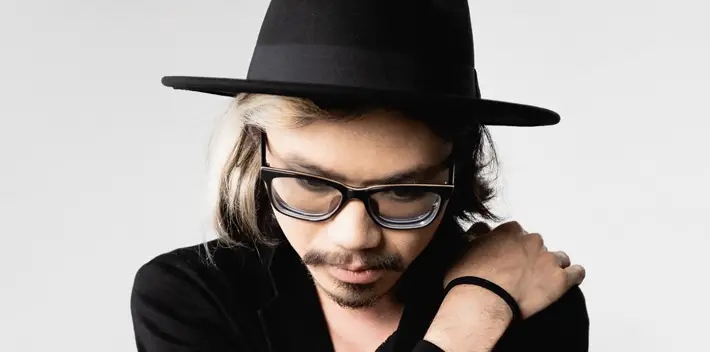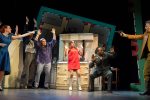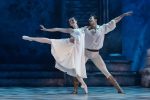A Q&A with Santipreecha

Electronic sound art from Thailand, based in LA…
What’s the title of your latest release, and what does it mean to you?
My latest release is ROUND A ROO. It’s my second album and is a further exploration into the experimental electronic world I began working with for my 2019 debut album, leaning more into underground techno and featuring a lot of modular synth performances recorded live and layered into the fabric of each piece.
What was the hardest part about putting this release together, and why?
I would say the hardest part of any release for me is the very end. That final day of mixing (I mix all my work on my own) is always tough because over the long period of time you’ve worked on the piece, you’ve zoned in so much that it’s very hard to step back and hear things completely fresh though I always try to incorporate that into my process. Apart from that this particular release was an absolute joy to work on. It had been two years since my first album and those years had been a tough time of personal and artistic exploration for me. Like my first album, this one came out of a lot of experimentation and also my continual explorations of circles and spirals and thematic ideas of obsession as well as my constant search to re-capture some of the energy of the folk music I grew up with from my home country (Thailand) but in a contemporary sense which I feel I captured in the track ‘ROUND A ROO ROUND’; all in all to say that there wasn’t too much pressure or fear of the ‘follow up album’ for me on this one.
What do enjoy most about producing your own material?
In electronic music in particular I find there is very little separation between the idea, the execution of that idea, the recording and the mixing unlike for example in classical concert music where you have the idea and you spend time writing out the score but then you collaborate with the performers, conductor, then the recording and mixing engineer etc. In a way the electronic music process is incredibly straightforward. You have the idea and you create the sound which involves synthesis but also manipulation and some mixing just to get a semblance of your idea down. Then you refine it from there. I love that because it’s an immediate path to exploring music particularly from a sonic perspective singularly without the need of translation though I of course love working and collaborating with other musicians as well.
What do you want the listener to take away from listening to your music?
For me all art is ultimately about self-realization which comes from both within and without in that it’s not just about realizing inner feelings and conditions but also the realization about the world around you and your place in it which of course includes questioning, and often times shifting perspective, or at least being presented with one that perhaps is different than yours. It’s what I love so much about art and I hope that the listener would be able to take that away from my music as well.
How does a track normally come together? Can you tell us something about the process?
The physical process of starting a track is usually quite intuitive for me. I sit down, or lie down and manoeuvre the gear/software and play around, interacting with what I created and going from there. But the inner process starts long before that point. I’m constantly reading, watching, listening, exploring different subject matters, different artforms, different studies (philosophy, psychology, history etc.) and I’m constantly jotting down ideas or questions (lots of questions) is my notebook or sheets of paper. I try to let all these ideas sink into the subconscious so when I start the physical process I’m not consciously thinking about it. Music I feel, like all art, is about the balance of the conscious and unconscious. After all, music is codified sound. What makes sound music is our human interaction with it and while that is in many ways conscious, there are of course subconscious elements as well… for example why do we often lean in to certain chords to express certain emotions? These musical structures (chords, melodies, rhythm) have been codified over the course of our history and have become to a large degree unconscious to us. On the other hand I always believe in the importance of questioning these things and trying to see/hear things from a new perspective hence the constant reading/listening/watching new things.
What band/artists have influenced you the most since you started this project, and why?
This one in particular the first free that come to mind are the manga artist Junji Ito, the electronic music pioneer Karlheinz Stockhausen and the jazz musician and composer Ornette Coleman. I’ve loved Ito’s art and manga work for some time, particularly Uzumaki which deals with an obsession with spirals, both of which I find fascinating. I love visual art. I’m a very visual person and I usually have very specific image to sound correlations though I would not say I have synesthesia. Stockhausen is just amazing. The way he thought of sound and electronic music not as its own genre (it didn’t exist then) but as parts and used it to explore and push music but also consciousness further through his art. And Ornette Coleman very similarly as well. I particularly love Coleman’s idea of someone seeking their own unison as a solo musician or in a group and his theory of harmolodics is incredible and very inspiring. There are some very intriguing parallels between the two of them in some of their works.
What countries would you like to tour? Are there any standout venues you’d like to play in?
Oh there are many. I would particularly love to tour Europe and hopefully Berlin someday as I’ve loved the underground scene there for some time now as well as its rich classical music history of course (I grew up with classical music) and I think the juxtapositions that still exist there today are very interesting.
If you could pick one track for our readers to listen to in order to get a taste of your music, what would you pick, and why?
I would probably pick ‘TRACK ONE’ from the new album because it has a good balance of both the more experimental sides but also the more groove/beat-based sides. Ultimately for me they exist in the same universe, the same musical language but I think the fact that it starts off in this mysterious way with the reminiscently Thai solo that builds into the beat and builds from there might be a good introduction for new listeners to my work.
What ambitions do you have for the band/your career?
There are several; I’d love to work on a sound exhibit whether physical or virtual or both at some point as I’m fascinated by the relationship of sound and space and how that’s changed for us today. I’d also love to continue to explore and engage with all the musical styles and instruments that exist for us today, of course incorporating it into my own viewpoint musically but always staying open to hearing new things.
Finally, as you leave the stage, what are your parting words?
The world of music and art now is more diverse than ever and I’m incredibly honoured to be engaging with it today and contributing to this cultural dialogue we are all having. Thank you for listening!
For more info visit: santipreecha.com










